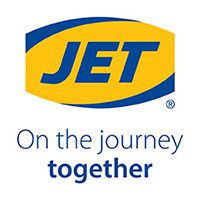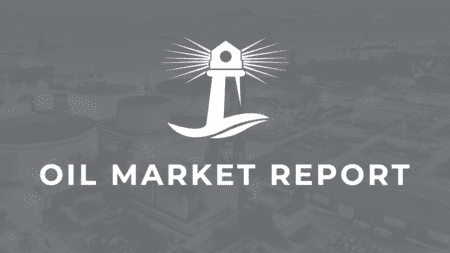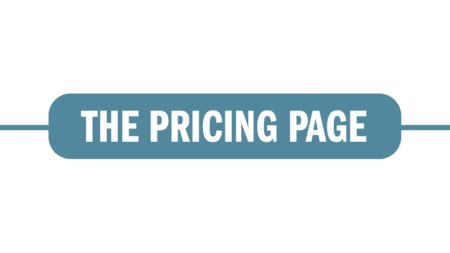
In January Topaz and Toyota announced a new partnership which sees four new Toyota cars being supplied for the Topaz Play or Park. Paul Candon (l) is pictured with Laura Murphy, loyalty manager Topaz and Steve Tormey, deputy managing director, Toyota Ireland
Clever marketing and a culture for continuous change sees Irish owned Topaz remain one of the most recognisable and trusted fuel brands in Ireland, says the company’s marketing director Paul Candon.
Topaz keeps Ireland moving, we like to say,” says Paul of the business that is 100% Irish owned, and has 330 service stations nationwide. It also has a strong interest in the aviation, marine, gas oil and lubricants market and services the needs of an estimated 250,000 home heating customers.
In its distribution business the company sells home heating oil to Topaz owned businesses north and south of the border and to authorised distributors – some of which use the Topaz brand and others who choose to use their own brand.
A trusted brand
Paul outlines how Topaz, which employs 1,700 people is one of the most recognisable fuel brands on the island and is what people consider a trusted brand. “We have been delivering home heating oil for over 35 years, first as Shell, then Statoil, and in our current guise as Topaz for the last six years.”
The trust that consumers have in Topaz has helped it to remain one of the biggest players in the industry – an industry that has suffered considerably during recessionary times not least from the issues with fuel laundering. “People are concerned about laundering and the product they receive,” Paul says highlighting the prevalence of fuel smuggling, mixing and laundering in border counties.
“It’s estimated that 10% of diesel is laundered,” he adds. “This represents a loss of around 3.5 million euro to the Irish government and also a sizeable revenue loss north of the border.”
Paul believes however that the ROM returns that traders are now required to make, following the introduction of such measures by the Irish Revenue just over 12 months ago, has helped to make businesses more accountable and has gone some way to counter the serious problem of laundering.
“There has been an uplift in business over the last 12 months which I can’t attribute fully to the introduction of ROM, but there could be a connection.”
He also believes that Ireland has turned a corner and is coming out of recession, which is helping to improve overall business. “North of the border where Topaz commands around 8% of the home heating market, business has remained a lot steadier over the last few years compared to the shakier Republic where it has about a 20% market share.”
Driving change
At Topaz, the company serves to drive change continually and review its strategies regularly. “There is a culture of continuous improvement and change with new ideas considered on an ongoing basis,” Paul explains.
Within the last 12 months Topaz has introduced a Play or Park loyalty scheme for customers, where points are gained for making purchases of any description at Topaz. The scheme has been a great success story offering customers an incentive to fulfil all their fuel needs with Topaz. One of the great advantages of the system, which currently has 270,000 customers registered, is that it now has a direct marketing route to customers enabling the company to see and trace spending habits and market accordingly.
Going forward, Topaz plans to increase its share of business in Northern Ireland and has recently brought new people in to prepare for the task. It also hopes to look at online sales and how much this arm of the business can be grown.
Another aim in its medium-term future is to look outside Ireland and at expanding into the UK and Europe, where it sees some room for expansion.
At present in the Republic, the company is happy to consolidate its position and continue to market itself as a quality and trusted brand and one that can compete on price and value – highlighting that the Topaz experience is a total package and value is not always just about price.
Paul uses the analogy of buying batteries:” If you were going to buy batteries, would you buy a brand like Duracell or a shop’s own brand? Price is one thing but value is something else entirely.”
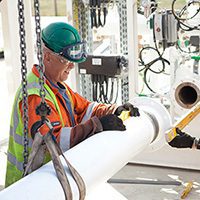
Major investment has been made at import and storage terminals; Greenergy holds its own physical oil at eight terminals, including North Tees
Greenergy is continuing to expand its role in the UK’s fuel supply chain as it pushes ahead with a major programme of infrastructure investment and develops its in-house logistics operation in Greenergy Flexigrid.
The company is already the largest of the independent wholesalers, supplying more than a quarter of the road fuel in the UK. It holds its own physical oil at eight terminals across the country, including at Thames, Teesside, Clydebank, Cardiff and Plymouth, and supplies customers from a further 16 locations – making it the country’s only national fuel supplier.
To consolidate its position in the UK market, Greenergy has made a number of major terminal investments over the last few years, including the purchase of former Petroplus refineries at Thames Oilport and at Teesside. These complement its previous investments in petrol blending facilities, new storage and distribution facilities at import terminals around the country. They also mean that Greenergy owns or part-owns the only two deep water jetty terminals in the UK.
Greenergy has also expanded its role in the delivery of fuel to company sites. The company has always been a major supplier of fuel on a delivered-in basis, but historically provided deliveries through third-party haulage companies. In order to improve control and service levels, it began insourcing these operations in 2012. Today the company employs around 250 drivers, based in 15 depots nationally and supported by operational centres at Thames and Tamworth. Tankers are either Greenergy livery, Flexigrid livery (providing a neutral service brand suitable for delivery to retail sites) as well as customers’ brands.
Andrew Owens, Greenergy chief executive explained: “Our aim is to create a low cost base without compromising on reliability and service, so we can offer the most competitive pricing for customers. To achieve that, we are continuing to make major investments in import and storage terminals in order to develop our service capability and meet the needs of our customers.
“By developing modern import terminals with deep water jetties, we can buy in large quantities from the lowest cost suppliers globally and move that low cost product to our other supply locations around the country.
“Our cost advantage also comes from a lean organisation that is highly automated. Investment in IT systems has created back-office efficiencies, minimised back office costs and provided for an error-free service for customers.”
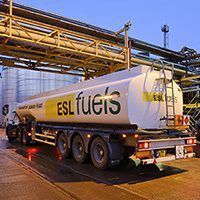
Improving the terminal’s capability has seen customer service and efficiency optimised says engineering manager, Phillip McEvoy
Since moving to its new terminal at Stanlow in Cheshire, ESL Fuels has gone from strength to strength.
ESL has invested in modern, sophisticated facilities and systems to bring the terminal up to date. The terminal is on the former BP Castrol site which closed in March 2010 with the loss of 60 jobs
Deputy editor Liz Boardman visited engineering manager, Phillip McEvoy to find out more about the company’s plans for growth.Innovation and diversification
“Innovation powers our long-term growth and is at the heart of what we do,” said Phillip. “Established in 1999, ESL Fuels pioneered the manufacture of alternative industrial fuels long before anyone was truly aware of the impact caused by greenhouse gases and CO2 emissions. We’ve gone on to diversify, specialising in the design, manufacture and supply of a wide range of innovative fuel products.
“The move to Stanlow has opened the doors for further diversification. We’re in a key location with extensive storage and have numerous opportunities to move the business forward.”
In addition to a long-standing partnership with Certas Energy, ESL has recently further strengthened its well established collaboration with Essar Oil (UK), by linking the two facilities together. “The infrastructure for growth is in place,” said Phillip.
“We have an excellent relationship with Essar – they have a good track record of supporting local companies and are helping us to grow the business.” This is being done by moving away from the traditional customer supplier model and moving towards a solutions driven collaboration between ESL and Essar. “We see Essar as a supportive and innovative business partner.”
Colin Dixon, Essar’s head of marketing commented: “Our partnership with ESL is a great example of Essar’s commitment to delivering world class service to our customers in the reseller channel. We’re proud to have supported ESL’s growth since the early days of their business.”
ESL operates a pipeline network that runs through the Stanlow refinery to the terminal’s quayside with the Manchester Ship Canal, opening up further opportunities for the company by having the ability to import and export products by ship.A bespoke service
ESL can offer a huge range of customer offerings, from standard storage solutions to bespoke discrete toll manufacturing and blending services.
“We have 112 tanks offering at total of 50,000 cubic meters of storage, of varying capacity and function. Any tank can be heated, agitated and blended with components from any other tank on site.
“We’re committed to working with customers and providing bespoke solutions. We pride ourselves in offering a good service at a reasonable cost.”
ESL has recently been awarded a major contract on behalf of a leading biodiesel supplier. This will see ESL blend up to an additional 100 million litres per year. This contract was awarded by working closely with the operator to provide a tailored solution to their requirements.
The company, which was founded by Stephen Whittaker and now employs 30 people, is also going through a program of major capital investment. This is focused on improving the terminal’s capability so customer service and efficiency will be optimised. Investment is also being targeted in terminal infrastructure and asset integrity. “Robust asset management is at the heart of everything we do, this allows us to sustainably provide an excellent service to all customers.”
ESL has also recently invested in four new In-Control loading skids to enable a quick turnaround for fuel collection for both customers and its own tanker fleet. Now supplying up to 180 million litres of alternative fuels per year, the company uses in house transport combined with dedicated haulage contractors to deliver a first class service.
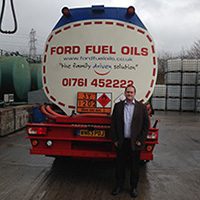
Following the recent acquisition of Countrywide’s fuels division, deputy editor Liz Boardman travelled down to Ford Fuel Oils’ Farrington head office to find out more about the family firm
Family values
From early roots in milk and coal after the Second World War to scrap metal in the early 1970s, Alan and Jack Ford founded the fuel business in 1972.Following in their footsteps, sons Adrian, Michael and Richard remain in the business whilst the family’s fourth generation – John, Teelah, David and Grayson – has also entered the business in recent years.
John Ford, now a director, joined the business at 15, working part time to gain valuable experience. Having worked in every area of the business, including two years as a full time driver, John can turn his hand to pretty much anything. “You can’t ask someone to do something that you wouldn’t do yourself,” he said.
“We have got to where we are now through family,” adds John. “Certainly we have increased in size since the Countrywide acquisition and now employ 120 people including 45 drivers, but we are still very hands on. Customers can still talk directly to a member of the Ford family. We often go to visit farmers and regularly speak to domestic customers over the phone. Equally we know all of our employees well and regularly talk to our drivers. That’s what sets us apart and ultimately accounts for our success. We like to think that we do things differently here – and better!”
A good fit
Although the company has tentatively dabbled in the acquisitions market in the past – mostly buying one man bands for access to their customer bases – the decision to acquire Countrywide’s fuels division in October 2013 was not one that the directors took lightly, as John explained: “We agonised over the decision but ultimately it looked right. It was a good opportunity and one which fits well with our business – not least geographically.
“We have strong family ethics and in many ways still view ourselves as a small, independent distributor. We’ve not lost touch with our roots and don’t want to be seen as a big corporate machine now we have a sizable acquisition under our belt. We don’t want to introduce high margins or have phones ringing off the hook – it would be a bad reflection on both the business and the acquisition itself.”
Now rebranded as Countrywide Oils – part of the family driven solution/part of the Ford Fuels Oils Group (the company’s two strap lines) the new section of the business will eventually come under the Ford banner with a dedicated website in the pipeline.
As far as further acquisitions go, Ford Fuel Oils is not currently in the market, as John pointed out. “We’ve already taken on a big acquisition and that’s enough for the foreseeable future. We don’t want to chase growth and put at risk what has taken years to build. We need a solid period of consolidation and we also need to take the time to build Countrywide Oils back up to where it used to be.” Nor is the company up for sale: “There have been a number of big distributor acquisitions recently but we are most definitely not for sale,” added John.
Supply solutions
With existing Ford depots in Farrington Gurney, Westerleigh, Stalbridge, Membury, Theale, Bow and North Petherton and newly added Countrywide Oils depots in Defford, Finmere, Presteigne and Weston Super Mare, the company has a good presence across the south of England with a significant stronghold in the south west.
Supplying in excess of 150 million litres of fuel each year, mostly to agricultural and domestic customers, the company also has a sizeable commercial customer base and services a number of local quarries. “The domestic and agricultural sectors remain by far our biggest markets. We are an old fashioned distributor – it’s what the business was built on,” John told Fuel Oil News. “However we are fortunate that we aren’t reliant on one sector. We haven’t really had a winter so far but have been able to pick up work in other markets.”
The company also supplies four million litres of Total, Petronas and its own brand lubricants – Lubricants Direct – per year. “Lubricants bring opportunities for fuel and vice versa,” said John. “We have our own bottling plant and can label containers with our customers’ logos, which is quite unusual for a distributor. It also gives us a good level of flexibility.”
Fuel cards is another albeit small arm to the business. “We supply approximately 15 million litres of fuel this way each year, explained John.” It’s a relatively small part of our business but one that’s convenient for our customers. If customers want to use fuels cards then we can supply them, although we are very wary credit-wise”
With a fleet of 43 tankers and another three on order from RTN Lakeland, Ford Fuel Oils moved up six places from 16th to 10th on this year’s Fuel Oil News’ Top 20 UK distributors list which was published in the February issue. “We have a long-standing relationship with RTN Lakeland and buy at least three rigid tankers each year. We are a company that likes to build lasting relationships and stick with them. We consistently use Emco Wheaton’s loading solutions and have long been a customer of Fuelsoft.”
More
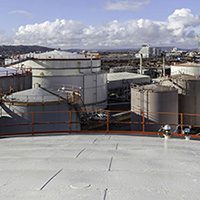
INVER CONTINUES TO GROW ITS UK BUSINESS BY EXPANDING THE SALES OFFERING FROM ITS CARDIFF TERMINAL; THE SIZE AND LOCATION OF WHICH HAS FACILITATED THE COMPANY’S GROWTH AND DIVERSIFICATION
Development projects in 2008, 2010 and 2012 have transformed the terminal from a heavy fuel oil terminal to a modern sophisticated facility supplying a full range of fuel products. The 74,000 m3 terminal now has multi-modal capability for receipt of fuel by ship, road and rail. The terminal’s automation system, 24/7 operations, and its 6 fast-pumping loading racks offer customers unparallel flexibility and efficiency.
A wider range of products
Capitalising on recently vacated storage capacity within the terminal, Inver has expanded its product offering.
The company is now selling a wide range of gas oils, kerosene, diesel, heavy fuel oil and marine fuels. Inver’s ability to purchase and store large economical cargoes, allows it to offer customers competitive pricing for these products. Sales have exceeded expectations in the first quarter; this is supported by the security of supply afforded through the import and storage of 20,000 tonnes of kerosene and low sulphur gasoil.
The company has observed the increasing product segmentation of the gas oil market: 10 ppm gasoil for non-road mobile machinery; 1000 ppm gasoil for industrial and commercial heating; and various grades of marine gasoil. Inver’s ability to import and store these various grades has allowed it to offer customers the right grade at the right price for the specific requirement.
Tony Wilson, commercial director of Inver UK since 2006, says that the expansion of Inver’s sales and product offering has been well received and welcomed by customers.
“The exit by other fuel importers in the area has reduced the security of supply and competitiveness in the market. Inver is committed to using its own terminal to maintain the supply of cost competitive product,” says Tony.
“Customers always want supply and pricing alternatives. Inver’s pricing options include contract and spot live pricing and both are proving popular. Our ability to supply ex-rack or to deliver using our fleet of dedicated road tankers is also an important optionality and service.”
Pete George – taking every opportunity to get out and meet customers
AN HONEST CONVERSATIONHeadquartered in Houston, Phillips 66 has 13,500 employees and, as of 31st December, 2013, had $50 billion worth of assets
‘On the back of a strong supply of quality products both in the wholesale markets and in the retail market as JET’, Phillips 66 continues to grow its market share here. Fuel Oil News editor, Jane Hughes asked managing director, Pete George about the business, refining and fuels and its relationship with fuel oil distributors.
Refining activity at Fawley dates back to the early 1920s when a small facility of around 12,000 barrels per day (bpd) with 600,000 metric tonnes (mt) annual distillation capacity was commissioned. The facility supplied just under 7% of the country’s then oil product requirements
A new refinery was commissioned by Esso in 1951 with a capacity of 110,000 bpd (5.5m mt/year). Subsequent additions took the total up to 330,000bpd (6m mt/year). In 2012 Esso undertook a reconfiguration of the plant, closing one of its three crude distillation units, resulting in a reduced total distillation capacity of 275,000 bpd.
Supplying 15% of the country’s requirements
As Britain’s largest refinery, Fawley now accounts for 18% of the country’s total refining capacity and supplies about 15% of oil product requirements.
The refinery’s fluid catalytic cracking unit has a capacity of 75,000 bpd, with substantial catalytic reforming capacity of around 95,000 bpd. Prior to the recent reduction in crude distillation capacity, its Nelson Complexity was reported to be 9.1. A figure of approximately 11.5 has been reported to be more representative of the current configuration, making this a high complexity refinery.
Fawley’s mile-long marine jetty – the largest independently-owned jetty facility in Europe – comprises 9 berths and handles around 2,200 ship movements and 22m mt of crude oil, oil products and chemicals per year. The facility can accommodate coasters or part laden tankers of up to 350,000 (deadweight) DWT. The refinery complex is supported by 330 storage tanks.
A chemicals plant is integrated with the refinery from which it receives feed stocks. The plant manufactures a range of products for the plastics, synthetic rubber and solvents industries, along with base oils, speciality chemicals and additives, with about 90% of its output exported.
A CHP plant was constructed in 2000 to service the refinery complex, with generating capability of 130 megawatts of electricity and 150 of heat.
Product movements
Fawley is first and foremost an inland refinery. Its supporting logistics infrastructure is configured to supply the lion’s share of its output to inland distribution terminals through its own 450-mile pipeline network.
This network takes up to 85% of Fawley’s total output, supplying over 30 million litres per day into the UK’s inland market. Around 10% of product is transported by coaster with 5% despatched by road from the Hythe road loading facility.
Testing out Euro VI – Reynolds Logistics has one Euro VI vehicle running to assess how it fits into the operation and its likely running costs
Paul Day, Turners( Soham)
“Euro VI is marginally less energy efficient, adds weight and costs more to purchase and maintain, however it has vastly reduced emissions which will reduce air pollution.
Overall it has added cost to the industry – something that it and the economy can ill afford, however that may be the price industry has to pay to get cleaner, greener trucks and better acceptance.”Andrew Reynolds, Reynolds Logistics “
At Reynolds Logistics we are running one Euro VI vehicle to assess how it will fit into the operation and the likely running costs. Initially the results were a bit mixed but following some intensive driver training the performance of the vehicle is improving.
At this time we would be reluctant to say that it will be a positive step towards energy efficiency, but we are hopeful it will not end up being a backwards step in relation to the latest generation Euro V vehicles.”Mark Nolan, Nolan Oils
“I see the introduction of Euro VI as a positive step towards our emissions program for the environment, but I think the government should be helping the transport industry to cover the extra costs involved.
All engines will use AdBlue so there is an additional cost if you are replacing an older vehicle. There are issues with the ADR Safe Loading Pass and the Regeneration Exhaust System when on the loading bay at terminals, which I understand are being addressed but the main cost is the purchase of the new engine which is approximately £7-£8k more expensive!
If the government want to meet these emission levels they should help fund the initiatives with financial support for the operator.”Jonny Morrow, Morrow Tanker Services
“The onset of Euro VI has been a huge talking point amongst prospective customers.
We’ve had an end of year rush of Euro V orders and have even stocked some pre-registered chassis’ having received feedback that Euro VI may be troublesome and expensive in early models.
We see a couple of problems with Euro VI – the first being the increased size of the exhaust/catalytic converter which leaves the clearing of the nearside virtually impossible. This in turn makes the fitting of bottom loading and metering equipment etc into the available space more troublesome, especially in shorter wheelbase rigid mini and midi tankers.
The second issue is the high temperatures that the exhaust will reach in the EGR (exhaust gas recirculation) cycle. This may become a problem when carrying petroleum products and may even be an issue with oil terminal safety and SLPs. “
Most Read







